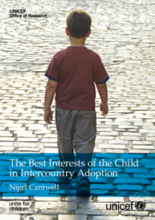This study, conducted by Nigel Cantwell and UNICEF, seeks to answer the question: “what is it that enables a policy, process, decision or practice to be qualified as either respectful or in violation of the best interests of the child in intercountry adoption?” The international human rights community universally agrees that the best interests of the child are a paramount consideration in intercountry adoption. However, there is less consensus on who is ultimately responsible for ensuring that the best interests of the child are honored in the adoption process or how to make that determination. This study proposes ways forward to ensuring that intercountry adoption is used appropriately and in the best interests of the child.
The report begins with chapters on the history and evolution of policies and programs enacted in the name of the “best interests of the child.” It also includes a review of the evolution of intercountry adoption, through a best interests lens. This historical review helps to demonstrate that what has been missing is a “globally accepted and well-defined basis for determining the best interests of the child in relation to intercountry adoption.” The report analyzes the policies and laws relevant to intercountry adoption against a best interests criterion, it proposes a detailed checklist of issues to be considered when determining the best interests of the child, and discusses the implications of the required procedure from the 1993 Hague Convention for preserving the child’s best interests in intercountry adoption. The report presents some of the current challenges to achieving the consideration of the child’s best interests in intercountry adoption and concludes with a review of some of the challenges to developing globally accepted bases on which to determine the best interests of the child, in order to pave the way forward.

